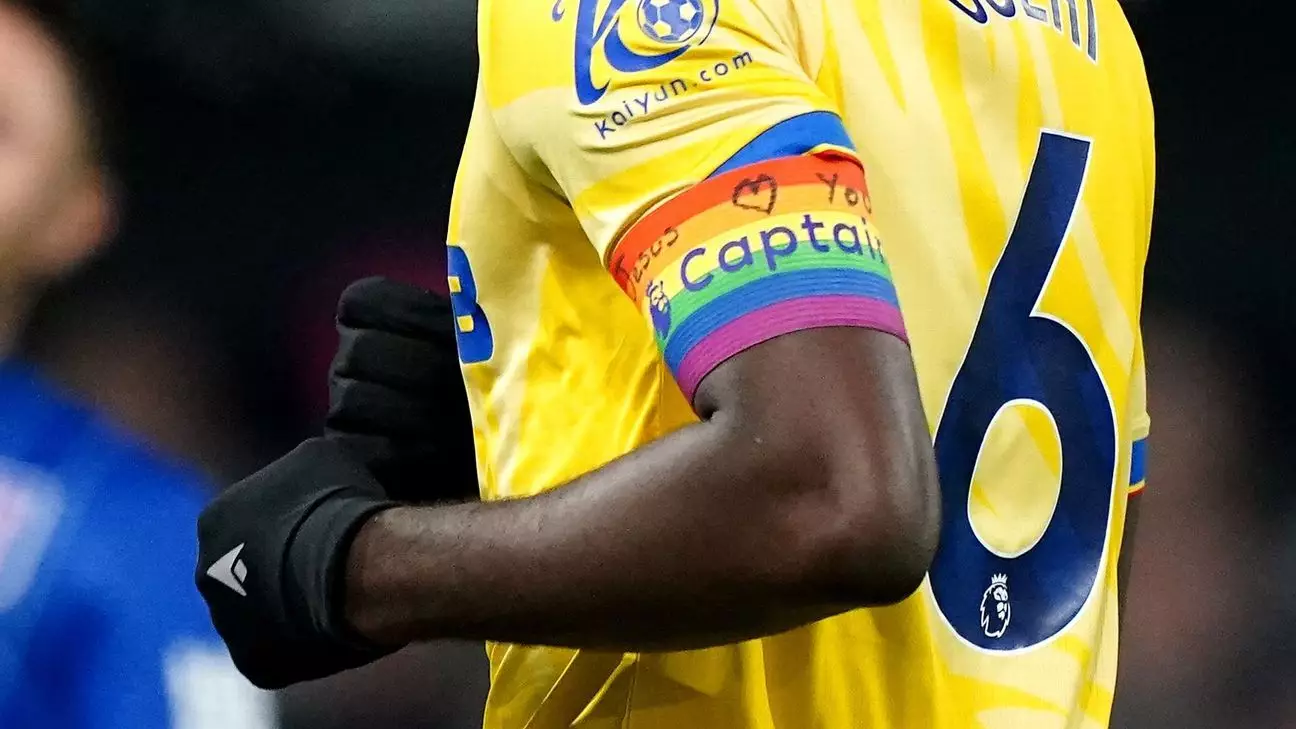In the realm of professional sports, the intersection of personal beliefs and regulatory frameworks often sparks intense debate. Recently, Crystal Palace defender Marc Guéhi found himself in the middle of such a discussion after he wrote “Jesus loves you” and “I love Jesus” on his rainbow-colored captain’s armband. This act raised eyebrows not only for its content but also because it seemed to clash with the Football Association’s strict regulations regarding kit slogans and messages. The incident, which took place during a match against Ipswich Town, emphasizes the continuing struggle between personal expression and adherence to established norms within the sporting community.
The armband in question comes from the Rainbow Laces campaign, which aims to promote LGBTQ+ inclusivity within football. It serves as a visible commitment to diversity and acceptance, signaling the sport’s dedication to creating a welcoming environment for all players and fans, regardless of their sexual orientation. Therefore, Guéhi’s choice to inscribe a religious statement on an armband associated with an LGBTQ+ campaign raises critical questions about the intended message and the implications of such a juxtaposition. The Football Association (FA) has stringent rules prohibiting religious messages on player kits, aimed at avoiding any semblance of endorsement or opposition to broader societal issues.
While Guéhi’s intentions were reportedly rooted in a message of love and inclusivity, the potential for misinterpretation is significant. The rainbow-colored armband, by its very nature, is emblematic of LGBTQ+ rights, and Guéhi’s religious inscription could be construed as contradictory or dismissive of the very values the armband represents. This concern underscores the intricate balance athletes must strike between asserting their beliefs and aligning with institutional regulations.
A Warning without Punishment
Following the FA’s warning prior to the Ipswich match, it was determined that Guéhi would not face any formal charges. While this decision appears to mitigate potential repercussions for the player, it simultaneously raises questions about the effectiveness and consistency of the FA’s regulations. How do they enforce rules designed to maintain the integrity of the sport without inadvertently silencing individual expression? The lack of formal action may suggest a degree of leniency, but it also throws into question the approach the FA takes when dealing with players who express themselves through alternative means.
Guéhi’s explanation of his actions, which he described as conveying a message of inclusivity, highlights the complexities of communication in sports. His attempt to combine personal belief with a symbol of inclusivity reveals the challenges athletes face when navigating their identity within a structured system that mandates conformity. The scenario illustrates that while institutions may strive for a unified front, the individuality of players can lead to fractious interpretations of rules.
The differing responses among teammates and opponents also merit attention. Ipswich midfielder Sam Morsy, a practicing Muslim, chose not to wear the rainbow armband during the match against Palace, opting for a standard black version instead. The FA does not view Morsy’s decision as a violation of kit regulations. This contrast between Guéhi and Morsy indicates that differing beliefs and cultural perspectives exist even within a shared professional environment, complicating the conversation surrounding inclusivity and representation in sports.
Morsy’s choice highlights the broader implications of personal belief systems within the context of team sports. While Guéhi expresses his faith through the lens of love and acceptance, Morsy exercises his autonomy in a manner that reflects his own convictions. The respect shown by the FA for Morsy’s decision suggests a recognition that the intersection of sports and identity is multifaceted and requires sensitivity to individuals’ beliefs.
The situation surrounding Marc Guéhi serves as a reminder of the layered complexities at play within professional sports. The balance between individual expression, regulatory compliance, and social responsibility remains a contentious discourse. As athletes become increasingly vocal about their beliefs, both religious and otherwise, sports organizations must navigate these waters delicately to foster an environment of inclusivity without sacrificing the integrity of their regulations. The ongoing conversation around players like Guéhi and Morsy underscores the importance of dialogue in an evolving sporting landscape where personal narratives hold significant weight.

